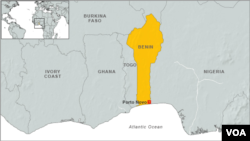DAKAR —
A budding protest movement has raised further concern about instability in the small West African nation of Benin, where officials say the president has been targeted in two separate coup attempts in the past year. The Red Wednesday movement is committed to preventing President Thomas Boni Yayi from seeking a third term.
For about a month, hundreds of residents of Benin’s capital, Cotonou, have dressed up in bright red clothing every Wednesday to send a peaceful but clear message of discontent with the government. Organizers of the Red Wednesday movement say they have been joined by allies in other towns throughout the country.
The demonstrators are angry about what they perceive to be an attempt by President Yayi to stay in office for a third term.Yayi became president in 2006 and won re-election in 2011. His current term expires in 2016, and term limits imposed by the constitution would prevent him from running again.
Yayi has tried to get parliament to take up the issue of constitutional reform.
He has made no explicit announcement about amending term limits, but Red Wednesday organizers such as Dieudonne Lokossou believe that is the reason for his interest in the project.
“Red Wednesday is a movement that is not happy with the manner that democracy is being implemented in Benin. So we have decided to wear red to show our disappointment," Lokossou said.
Red Wednesday members say they are fed up with what they describe as a lack of opportunity in Benin, whose economy is dominated by cotton production.
But there are also at least some links between the protest movement and recent political tensions, which were brought into focus last October when officials announced that three people close to the president, including his niece and doctor, had plotted to poison him.
Judicial officials have said the plot was organized by Patrice Talon, a wealthy player in the cotton industry and a former ally of President Yayi. Talon is currently in France. In interviews conducted there, he has said he helped finance Yayi’s election campaigns but split with the president over his ambition to seek re-election in 2016.
Yayi has said Talon wanted to use lucrative state contracts to grow his fortune, and became upset when those contracts were canceled.
In addition to the poisoning attempt, Benin officials said in March they had foiled a second coup attempt involving an associate of Talon’s.
A lawyer for Talon, Joseph Djogbenou, has played a key role in organizing the Red Wednesday protests.
Meanwhile, Talon seems to be at least temporarily protected in France, which has asked for more information before considering a request to extradite him to Benin. Lydie Boka, manager of the risk analysis firm Strategico, said it was likely that Talon would be able to create more headaches for the president if he wanted.
"The fact is that Talon is a guy who hates Yayi. It’s reciprocal," he said. "And France allows Talon to be here, and France tells Yayi, ‘Leave him alone,’ more or less."
The animosity between the two men may have influenced Yayi’s decision to sack his government last week, Boka said. In a new Cabinet announced this week, several prominent Talon supporters were removed, while officials who have been vocal in their support of Yayi stayed on.
For about a month, hundreds of residents of Benin’s capital, Cotonou, have dressed up in bright red clothing every Wednesday to send a peaceful but clear message of discontent with the government. Organizers of the Red Wednesday movement say they have been joined by allies in other towns throughout the country.
The demonstrators are angry about what they perceive to be an attempt by President Yayi to stay in office for a third term.Yayi became president in 2006 and won re-election in 2011. His current term expires in 2016, and term limits imposed by the constitution would prevent him from running again.
Yayi has tried to get parliament to take up the issue of constitutional reform.
He has made no explicit announcement about amending term limits, but Red Wednesday organizers such as Dieudonne Lokossou believe that is the reason for his interest in the project.
“Red Wednesday is a movement that is not happy with the manner that democracy is being implemented in Benin. So we have decided to wear red to show our disappointment," Lokossou said.
Red Wednesday members say they are fed up with what they describe as a lack of opportunity in Benin, whose economy is dominated by cotton production.
But there are also at least some links between the protest movement and recent political tensions, which were brought into focus last October when officials announced that three people close to the president, including his niece and doctor, had plotted to poison him.
Judicial officials have said the plot was organized by Patrice Talon, a wealthy player in the cotton industry and a former ally of President Yayi. Talon is currently in France. In interviews conducted there, he has said he helped finance Yayi’s election campaigns but split with the president over his ambition to seek re-election in 2016.
Yayi has said Talon wanted to use lucrative state contracts to grow his fortune, and became upset when those contracts were canceled.
In addition to the poisoning attempt, Benin officials said in March they had foiled a second coup attempt involving an associate of Talon’s.
A lawyer for Talon, Joseph Djogbenou, has played a key role in organizing the Red Wednesday protests.
Meanwhile, Talon seems to be at least temporarily protected in France, which has asked for more information before considering a request to extradite him to Benin. Lydie Boka, manager of the risk analysis firm Strategico, said it was likely that Talon would be able to create more headaches for the president if he wanted.
"The fact is that Talon is a guy who hates Yayi. It’s reciprocal," he said. "And France allows Talon to be here, and France tells Yayi, ‘Leave him alone,’ more or less."
The animosity between the two men may have influenced Yayi’s decision to sack his government last week, Boka said. In a new Cabinet announced this week, several prominent Talon supporters were removed, while officials who have been vocal in their support of Yayi stayed on.





